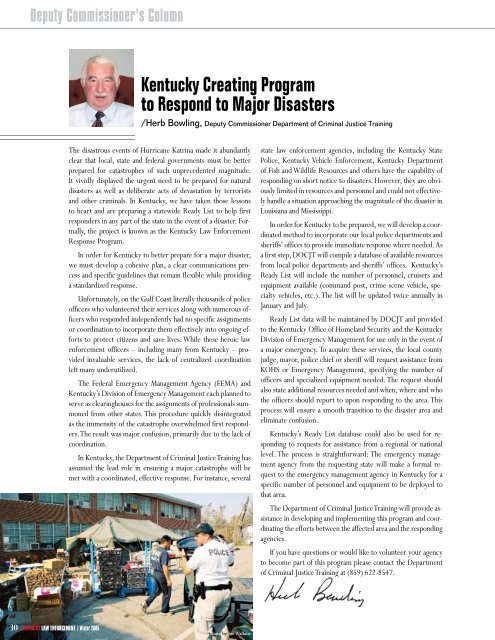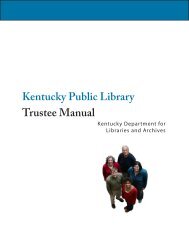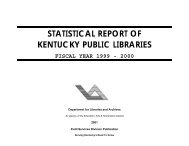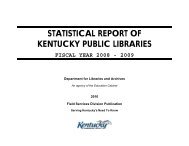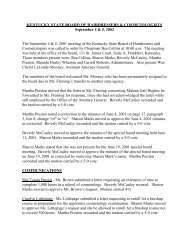4 - e-archives Home
4 - e-archives Home
4 - e-archives Home
Create successful ePaper yourself
Turn your PDF publications into a flip-book with our unique Google optimized e-Paper software.
Deputy Commissioner’s Column<br />
30 KENTUCKY LAW ENFORCEMENT| Winter 2005<br />
Kentucky Creating Program<br />
to Respond to Major disasters<br />
/herb bowling, deputy Commissioner department of Criminal Justice Training<br />
the disastrous events of Hurricane Katrina made it abundantly<br />
clear that local, state and federal governments must be better<br />
prepared for catastrophes of such unprecedented magnitude.<br />
It vividly displayed the urgent need to be prepared for natural<br />
disasters as well as deliberate acts of devastation by terrorists<br />
and other criminals. In Kentucky, we have taken those lessons<br />
to heart and are preparing a statewide ready List to help first<br />
responders in any part of the state in the event of a disaster. Formally,<br />
the project is known as the Kentucky Law enforcement<br />
response Program.<br />
In order for Kentucky to better prepare for a major disaster,<br />
we must develop a cohesive plan, a clear communications process<br />
and specific guidelines that remain flexible while providing<br />
a standardized response.<br />
unfortunately, on the Gulf Coast literally thousands of police<br />
officers who volunteered their services along with numerous officers<br />
who responded independently had no specific assignments<br />
or coordination to incorporate them effectively into ongoing efforts<br />
to protect citizens and save lives. While these heroic law<br />
enforcement officers – including many from Kentucky – provided<br />
invaluable services, the lack of centralized coordination<br />
left many underutilized.<br />
the Federal emergency Management agency (FeMa) and<br />
Kentucky’s Division of emergency Management each planned to<br />
serve as clearinghouses for the assignments of professionals summoned<br />
from other states. this procedure quickly disintegrated<br />
as the immensity of the catastrophe overwhelmed first responders.<br />
the result was major confusion, primarily due to the lack of<br />
coordination.<br />
In Kentucky, the Department of Criminal Justice training has<br />
assumed the lead role in ensuring a major catastrophe will be<br />
met with a coordinated, effective response. For instance, several<br />
/Photo by Joe Wallace<br />
state law enforcement agencies, including the Kentucky state<br />
Police, Kentucky Vehicle enforcement, Kentucky Department<br />
of Fish and Wildlife resources and others have the capability of<br />
responding on short notice to disasters. However, they are obviously<br />
limited in resources and personnel and could not effectively<br />
handle a situation approaching the magnitude of the disaster in<br />
Louisiana and Mississippi.<br />
In order for Kentucky to be prepared, we will develop a coordinated<br />
method to incorporate our local police departments and<br />
sheriffs’ offices to provide immediate response where needed. as<br />
a first step, DOCJt will compile a database of available resources<br />
from local police departments and sheriffs’ offices. Kentucky’s<br />
ready List will include the number of personnel, cruisers and<br />
equipment available (command post, crime scene vehicle, specialty<br />
vehicles, etc.). the list will be updated twice annually in<br />
January and July.<br />
ready List data will be maintained by DOCJt and provided<br />
to the Kentucky Office of <strong>Home</strong>land security and the Kentucky<br />
Division of emergency Management for use only in the event of<br />
a major emergency. to acquire these services, the local county<br />
judge, mayor, police chief or sheriff will request assistance from<br />
KOHs or emergency Management, specifying the number of<br />
officers and specialized equipment needed. the request should<br />
also state additional resources needed and when, where and who<br />
the officers should report to upon responding to the area. this<br />
process will ensure a smooth transition to the disaster area and<br />
eliminate confusion.<br />
Kentucky’s ready List database could also be used for responding<br />
to requests for assistance from a regional or national<br />
level. the process is straightforward: the emergency management<br />
agency from the requesting state will make a formal request<br />
to the emergency management agency in Kentucky for a<br />
specific number of personnel and equipment to be deployed to<br />
that area.<br />
the Department of Criminal Justice training will provide assistance<br />
in developing and implementing this program and coordinating<br />
the efforts between the affected area and the responding<br />
agencies.<br />
If you have questions or would like to volunteer your agency<br />
to become part of this program please contact the Department<br />
of Criminal Justice training at (859) 622-8547.


